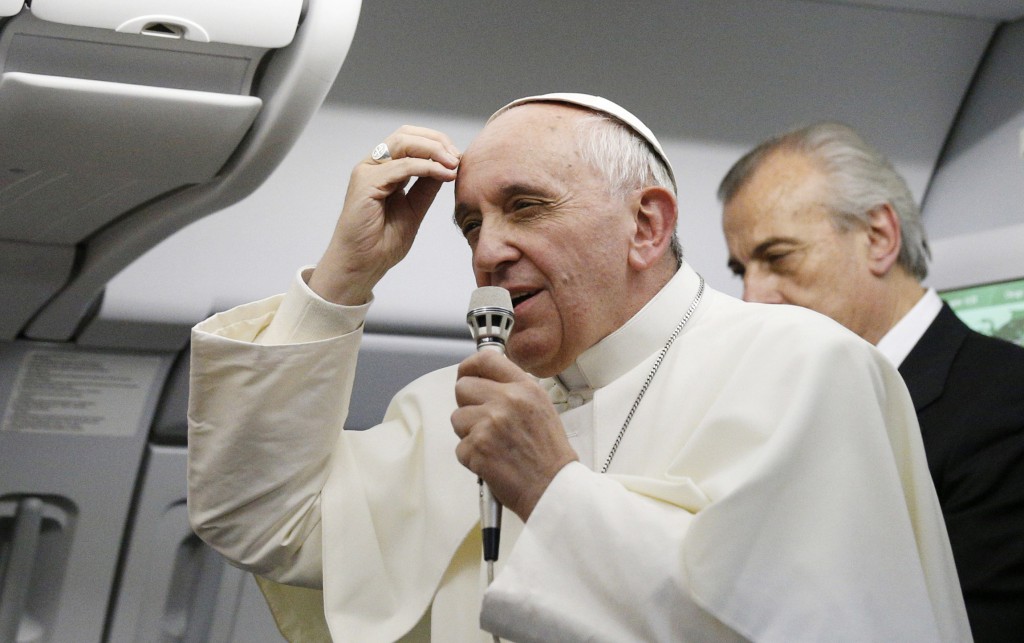
By Cindy Wooden
When Pope Francis told reporters July 28, “Who am I to judge” a homosexual person, he was emphasizing a part of Catholic teaching often overlooked by the media and misunderstood by many people.
In the words of the Catechism of the Catholic Church, the church teaches that homosexual people “must be accepted with respect, compassion and sensitivity” and that “every sign of unjust discrimination in their regard should be avoided.”
But the catechism also describes a “homosexual inclination” as “objectively disordered” and homosexual acts as “intrinsically disordered,” because sexuality is “an integral part of the love by which a man and a woman commit themselves totally to one another until death.”
The church teaches that any sexual activity outside the bond of marriage between a man and a woman is sinful. Pope Francis did not change or challenge that teaching.
Pope Francis made his comments about homosexuality during a news conference with reporters flying with him from Brazil to Rome.
The pope was asked about what has been described as a “gay lobby” in the Vatican, allegedly a group of priests and bishops who work at the Vatican and protect each other. Pope Francis said it was important to “distinguish between a person who is gay and someone who makes a gay lobby.”
“A gay person who is seeking God, who is of good will — well, who am I to judge him?” the pope said. “The Catechism of the Catholic Church explains this very well. It says one must not marginalize these persons, they must be integrated into society. The problem isn’t this (homosexual) orientation — we must be like brothers and sisters. The problem is something else, the problem is lobbying either for this orientation or a political lobby or a Masonic lobby.”
Although the question to the pope was about gay Vatican employees, the pope’s response was not specifically about priests who are homosexual, a question addressed in 2005 by the Congregation for Catholic Education, which was in charge of seminaries at the time.
The document was titled, “Instruction Concerning the Criteria for the Discernment of Vocations With Regard to Persons With Homosexual Tendencies in View of Their Admission to the Seminary and to Holy Orders.”
The church distinguishes between homosexual acts and homosexual tendencies or orientation, it said. The church, unlike much of the public, does not assume all those with a homosexual orientation are sexually active, just as it does not assume all heterosexuals are sexually active.
Men “who practice homosexuality, present deep-seated homosexual tendencies or support the so-called ‘gay culture'” are not to be admitted to Catholic seminaries or to be ordained, it said, although it did not give a detailed explanation of what exactly constitutes a “deep-seated” homosexual tendency.
While excluding their suitability for ordination, it said, “such persons must be accepted with respect and sensitivity. Every sign of unjust discrimination in their regard should be avoided. They are called to fulfill God’s will in their lives and to unite to the sacrifice of the Lord’s cross the difficulties they may encounter.”
New York Cardinal Timothy M. Dolan, president of the U.S. Conference of Catholic Bishops, speaking on “CBS This Morning” July 30, said Pope Francis’ remarks on the plane reflect “a gentle, merciful, understanding, compassionate” approach to church teaching which emphasizes “that while certain acts may be wrong, we would always love and respect the person and treat the person with dignity.”
Pope Francis’ words “may be something people find new and refreshing,” Cardinal Dolan said, but “I for one don’t think it is and I hate to see previous popes caricatured as not having that.”
The current pope’s approach to the question of homosexuality on the flight from Brazil reminded some journalists of the approach Pope Benedict XVI took to a question about gay marriage during a July 2006 flight to Spain where he celebrated the World Meeting of Families.
“It’s true that there are problems and things that Christian life says no to,” he told reporters. “We want to make people understand that according to human nature it is a man and a woman who are made for each other and made to give humanity a future.”
However, he said, instead of focusing on condemning attempts to legally recognize homosexual unions, “let’s shine a light on the positive things, so we can make people understand why the church cannot accept certain things, but at the same time wants to respect people and to help them.” – CNS